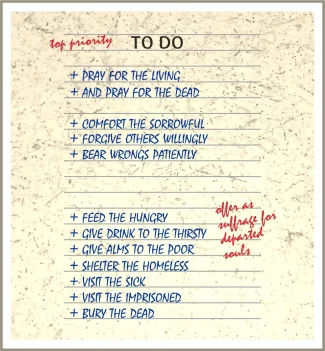
Acts of Mercy References
From The Catechism of the Catholic Church
(CCC 2447)
The works of mercy are charitable actions by which we come to the aid of our neighbor in his spiritual and bodily necessities (cf. Isaiah 58:6-7; Hebrews 13:3). Instructing, advising, consoling, comforting are spiritual works of mercy, as are forgiving and bearing wrongs patiently. The corporal works of mercy consist especially in feeding the hungry, sheltering the homeless, clothing the naked, visiting the sick and imprisoned, and burying the dead (cf. Matthew 25:31-46). Among all these, giving alms to the poor is one of the chief witnesses to fraternal charity: it is also a work of justice pleasing to God (cf. Tobit 4:5-11; Sirach 17:22; Matthew 6:2-4).
He who has two coats, let him share with him who has none and he who has food must do likewise (Luke 3:11). But give for alms those things which are within; and behold, everything is clean for you (Luke 11:41). If a brother or sister is ill-clad and in lack of daily food, and one of you says to them, “Go in peace, be warmed and filled,” without giving them the things needed for the body, what does it profit? (James 2:15-16; cf. 1 John 3:17)
From St Faustina Diary
(Diary 742)
“I demand from you deeds of mercy, which are to arise out of love for Me. You are to show mercy to your neighbors always and everywhere. You must not shrink from this or try to excuse or absolve yourself from it. I am giving you three ways of exercising mercy toward your neighbor: the first — by deed, the second — by word, the third — by prayer. In these three degrees is contained the fullness of mercy, and it is an unquestionable proof of love for Me. By this means a soul glorifies and pays reverence to My mercy”.
(Diary 1317)
“Many souls … are often worried because they do not have the material means with which to carry out an act of mercy. Yet spiritual mercy, which requires neither permissions nor storehouses, is much more meritorious and is within the grasp of every soul. If a soul does not exercise mercy somehow or other, it will not obtain My mercy on the day of judgment. Oh, if only souls knew how to gather eternal treasure for themselves, they would not be judged, for they would forestall My judgment with their mercy”.
From the Bible
(2 Maccabees 12:38-46)
Thereupon Judas rallied his forces and advanced to the town of Adullam. Inasmuch as the seventh day of the week was at hand, they purified themselves according to custom and kept the Sabbath there.
On the following day, since the need had now become urgent, Judas and his men went to collect the bodies of those who had fallen and to bury them with their kindred in their ancestral tombs. However, under the tunic of each of the dead, they found amulets that were sacred to the idols of Jamnia, which the law forbids the Jews to wear. Thus it was clear to everyone that this was the reason that these men had been slain. And so they all praised the acts of the Lord, the just judge who reveals things that are hidden, and they turned to supplication, praying that the sin that had been committed might be completely blotted out. The noble Judas exhorted the people to keep themselves free from sin, since they had seen with their own eyes what had happened as a result of the sin of those who had fallen.
Then he took up a collection from all of his soldiers, amounting to two thousand silver drachmas, and sent it to Jerusalem to provide for an expiatory sacrifice. In doing this, he acted in a suitable and honorable way, guided by his belief in the resurrection. For if he had not expected those who had fallen to rise again, it would have been superfluous and foolish to pray for the dead. However, if he was focusing on the splendid reward reserved for those whose death was marked by godliness, his thought was holy and devout. Therefore, he had this expiatory sacrifice offered for the dead so that they might be delivered from their sin.
PSALMIC REFLECTION ON LUKE 6:36 Be merciful as your Father is merciful
They were hungry and thirsty, and their lives ebbed away. Then they cried out to the Lord in their trouble, and he delivered them from their distress… Let them give thanks to the Lord for his unfailing love and his wonderful deeds for mankind, for he satisfies the thirsty and fills the hungry with good things. (From Psalm 107)
